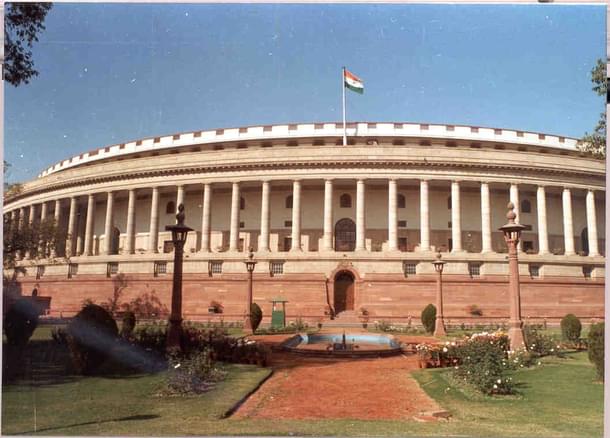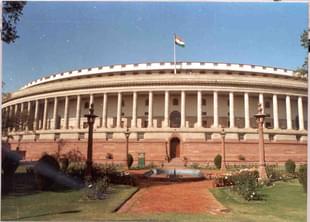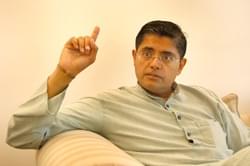Books
Both Houses Of Parliament Need Reform; And LS Needs To Become The Upper House
Anish
Dec 28, 2015, 05:37 PM | Updated Feb 12, 2016, 05:32 PM IST
Save & read from anywhere!
Bookmark stories for easy access on any device or the Swarajya app.


Indian democracy desperately requires reforms in parliamentary functioning.
Many people have been asking for reforms in parliamentary functioning for long now. Never ever was this need felt more compellingly than now, as we watch the unseemly spectacle of cynical sloganeering in both the houses, obdurate obstructionism in the Rajya Sabha (RS), and an almost “scorched earth” policy being followed by the largest opposition party.

Jay Panda of the BJD has masterfully written two excellent pieces on the need for reforming the RS (here and here). Amazingly, instead of sparking a debate, he was served with a privilege motion by some RS members. Obviously, the answer to cussedness must be a sharper call to debate by more and more people. This article explores the topic in three sections, what can be done in the RS, the Lok Sabha (LS) and few things that need to be done in both the Houses.
Changes required in the Rajya Sabha
- Not the designated Upper House: The RS is primarily modelled on the House of Lords and is hence called the Upper House. However, in practice, if one were to review the data on attendance or productivity, it has hardly behaved like an “upper house”. Since the LS is the directly elected house, and in a democracy people are not just supreme but sovereign, the LS should be declared the Upper House, and the RS as the Lower House. This redesignation will continue unless and until the RS also becomes a directly elected house like in the US (House of Congress), in order to retain its “upper” house status (there is a specific proposal for this later). This is not just for semantics, but entails as follows:
– All Bills should be introduced first in the LS, and only then sent to the RS for a “review” and feedback, but not for passing. This means that the output from the RS to the LS will be a set of proposed amendments, and not an “approved” Bill. The LS then can accept or reject the specific amendments proposed by the RS, and the Bill should then be considered an Act.
– All Bills sent to the RS from the LS will be mandatorily treated similar to “money bills”, which means that the RS must take this up and revert to the LS within 14 working sessions, with its proposed amendments, and if it doesn’t do that, the Bill will be treated as “passed” by the RS, get lapsed therein, and the LS can go ahead and convert it into an Act.
- Equal Representation to all States: The current distribution of seats within the RS across states is highly skewed in favour of the larger states, as it is largely based on population. Since the LS seats are also based on population, this gives a double advantage to the larger states, which is extremely unfair. Since an RS Member of Parliament (MP) is supposed to represent the entire state, and all states of the union by definition should be treated as equal, the number of seats that each state should have in the RS should also be equal. The Union Territories, being directly ruled by the centre, and constitutionally having a “lesser” status, should have half the number of seats as a state. This would work out as follows:
– There are 250 seats in the RS, wherein 238 are represented by the 29 States and 7 UTs, while 12 are nominated by the President.
– Following the principle of equal seats to all states, and half that number to all UTs, each state would have 7 seats and each UT would have 3 seats, which total up to 236.
– The two leftover seats can be added to the nominated seats and hence the president will be able to nominate 14 members instead of the 12 currently.This mathematics would have to be revisited when newer states are created in the Union (which I am a strong votary of in any case).
– This approach would significantly change the political dynamics in the country, and eliminate the short shrift that is given to the smaller states and UTs, thus increasing their political importance, and hence the attention that they will receive from “mainstream” politicians, who inevitably come from larger states.
- Directly elected Rajya Sabha: This is the most important and likely to be the most controversial reform that needs to be attempted. However, the suggestions herein are slightly different from what has been proposed in the past by many commentators. The biggest and most valid criticism for RS MPs has been that many of them are also “unelectable” along with being unelected, and sometimes get accommodated simply because they have lost an LS election. This needs to change. Some suggestions for this are as follows:
The state-wise voting process
– Any voter can additionally get registered as an “RS voter” for that state by paying a one-time registration fee of INR 1,000/- (this will ensure that only serious voters who intend to vote get registered). They will mandatorily need an Aadhaar card for this and also need to register their mobile number.
– The voting process will be electronic (either through the internet or mobile devices), which has been successfully tried out in local elections in Gujarat.
– Each national and “state” party will be able to put up as many candidates as the number of seats in that state (7 in a state, and 3 in a union territory). Each voter will also have the same number of votes. The top seven vote-getters will be declared as having won the election and shall get to represent the state in the RS.
– No physical campaigning will be allowed by any party or candidate, but only through the media (print, electronic or social).
– The two-year periodicity of elections for 1/3rd of the RS will remain unchanged.
- Qualifications for becoming an RS candidate – Since there is significant criticism of the kind of candidates that the RS gets, we need to have certain standards on who is eligible to stand for an RS election. An indicative set of qualifications is as follows:
– Should be a registered voter in that state (Manmohan Singh from Assam would be disqualified)
– Minimum age – 60 years (this is to maintain the “house of elders” character of the RS)
– Should have won at least three elections in the past, either for the LS or a state assembly, and from that state / UT only (this is to ensure that people who come to the RS know what it means to get elected by the people of that state, and now need to represent the entire state not just a constituency)
Changes required in the Lok Sabha
- Change in nominated members: There are two members nominated to the LS representing the Anglo Indian Community. This is a vestige of the British Raj, and is unjustifiable in today’s modern Independent India. However, the concept of giving mandatory representation to India’s “micro” communities is justifiable, as they are largely unable to enter the LS through the normal route through major political parties. This needs to be changed as follows:
– Increase the number of nominated seats from the current two to four.
– Reserve two of these seats for India’s “micro” communities, which should be captured in a specific schedule. An indicative list of micro communities are – Anglo Indians, Parsis, Jews, Siddis, Chinese-origin Indians, Tibetans, Afghan/Pak – origin Hindus and Sikhs, Kashmiri Pandits, Jarawas, etc.
– Reserve one each from the remaining two seats for people from Pakistan-Occupied Jammu & Kashmir and Gilgit-Baltistan.
– This step will ensure that the Indian “Upper House”, i.e. the house of the people, gets to mandatorily listen to the voices it has consistently been ignoring for the last 67 years.
- Private Member’s Bills: The disdain with which the Lok Sabha treats attempts by private members bills has to be seen to be believed. Shashi Tharoor’s attempt to bring a bill decriminalising section 377 of the IPC is a classic example. This needs to change.
– Any LS MP should have the right to introduce a maximum of one Private Bill any time in the duration of a Lok Sabha (five years).
– If introduced, this will have to be accepted by the Speaker and should trigger a parliamentary debate and reference to a select committee.
– It cannot be rejected without a discussion, as is the norm.
Changes required in both the Houses
- Disruptions: People of this country have watched helplessly as both the major national parties of the country have held entire sessions to ransom, irrespective of the validity (or lack of it) of the issue at hand. Senior leaders of both parties have justified such tactics. This cannot be allowed in the largest democracy of the world.
– Entry by members of the house into the well should be banned. The Marshals should be given standing instructions to evict any member who violates this rule, and the member will remain expelled for the rest of the day. Sloganeering within the house should also be similarly banned, and must carry the same penalty.
– Calling for an all-party meeting should be the right of the Leader of the House and of the Opposition. This should be the forum to resolve issues that might lead to the disruption. Walking out should also be a legitimate parliamentary tactic for the opposition if they do not agree with the way the house is functioning.
– In order to ensure that illegitimate functioning of the house does not happen due to a walkout by the opposition, the quorum should be increased to 50 percent (from the current 10 percent). It is a mockery of our democracy when parliamentary business is conducted with say 11 percent of the members present in the house.
– In order to incentivise members to remain present in the house, their salaries should be converted into “sitting fees”, on a pro rata basis, for the number of hours that they have been present in the house. If a member’s attendance falls below a particular threshold (say 25 percent), then he should be banned from the House for the rest of the session.
– The steps proposed above will not only increase attendance dramatically, but also improve productivity.
- Joint Committees: All Committees of Parliament (e.g. Standing Committee, Select Committee, etc.) should be converted into “joint committees”, consisting of equal representation from both houses. This will eliminate dilatory tactics of sending bills to “select committees” in both houses. It will be more efficient for Parliament that both houses work jointly, which will improve productivity and also the quality of oversight.
- Secret voting: The current system of voice votes is efficiency-enhancing and should be continued. However, the process of “vote division” through the electronic voting system is questionable. The whole principle of voting in Parliament is representative in nature (i.e. the MP votes on behalf of the people, and therefore not on behalf of the political party). This should be mandatorily converted into a secret ballot, so that political parties don’t hijack the vote of an individual MP. The “whips” that are a valid part of floor management should be for ensuring attendance, and not controlling the vote. Given the fact that the individual MP has been given the right by the people of his constituency to vote on their behalf, he should exercise his best judgment, and vote accordingly, and not on the basis of what the concerned party bosses want. The only exception to this rule should be the vote of confidence. All other types of voting should be confidential.
There is one final point that I would like to suggest, while talking about parliamentary reforms. This is triggered by the unseemly fight between the Legislature and the Judiciary on the NJAC issue, and also other instances where certain constitutional bodies are unaccountable.
In any democracy, the people are always supreme and considered to be sovereign. No constitutional body or arm of government should see itself as unanswerable to the people of the country. The only way in which the people of the country exercise control is through the Lok Sabha (for now, unless the Rajya Sabha also becomes directly elected). I propose the following measures to address this lacuna.
- Form a Joint Parliamentary Committee of ten members (five each from both the Houses), consisting of the senior most members. The ex officio members of this committee will be the Speaker, Chairman of the RS, the PM, House Leader of the LS & RS (if not the PM), and Leaders of Opposition in LS & RS. The rest of the members can be nominated or even elected. The name of this Committee can be the Parliamentary Oversight Committee.
- Once in a year, the heads of the Executive (PM), Judiciary CJI), as also all other constitutional bodies (like RBI, Election Commission, CVC, Lokpal, CBI, NHRC, Minorities Commission, NITI Aayog, etc.) will have to address a sitting of the Joint Houses of Parliament in the Central Hall on their activities, achievements, plans, and constraints. Post the address, they will also need to answer a selection of “per-submitted” questions, which can only be asked by any member of the Committee (as above). I would add the Press Council of India in this list also.
- This entire session should be televised and seen by the people of the country.
- The President of India should be a standing invitee to this session.
The reason I feel strongly about this is that the people of India need to be able to see and evaluate the work of various arms of the Government of India, which is being done on their behalf and in their name. The quality of debate within the country cannot improve unless the quality of oversight as well as the transparency of that oversight dramatically changes. This is something that Indian democracy desperately requires.
The writer works for a leading professional services firm





